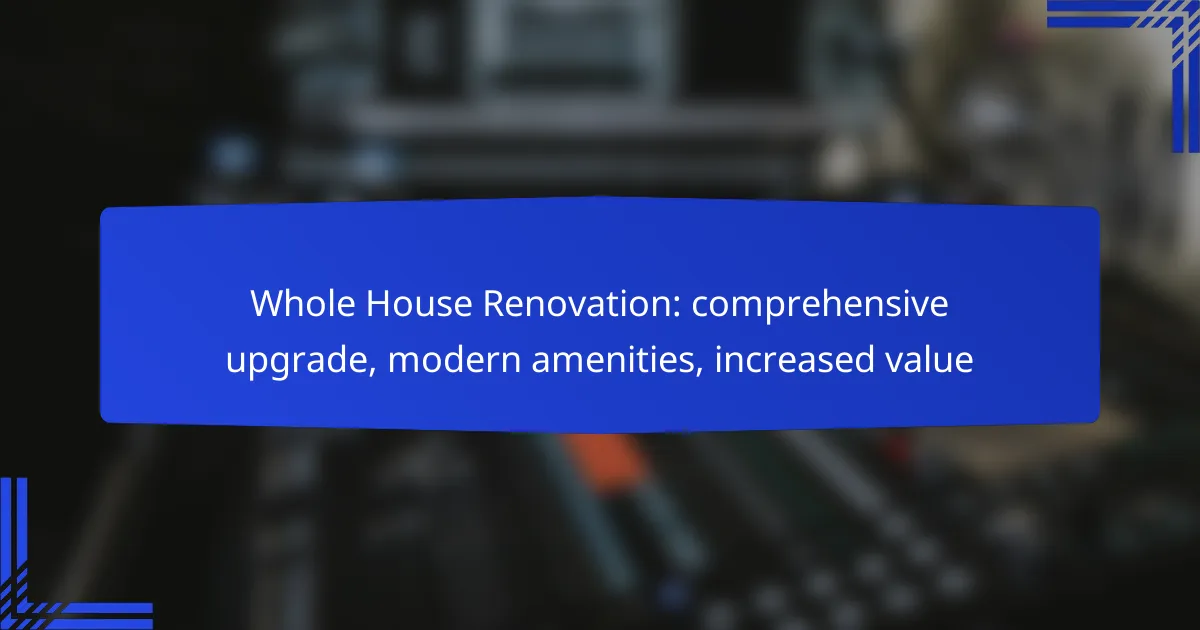A whole house renovation is an excellent way to enhance your living space while significantly increasing your property’s value. By integrating modern amenities and improving energy efficiency, you create a more comfortable and sustainable environment for your family. This comprehensive upgrade not only transforms your home but also serves as a wise investment for the future.

What are the benefits of whole house renovation?
A whole house renovation offers numerous advantages, including increased property value, enhanced energy efficiency, and modernized living spaces. By upgrading your home comprehensively, you not only improve your living environment but also make a sound investment for the future.
Increased property value
One of the primary benefits of a whole house renovation is the potential for increased property value. Homes that are updated with modern amenities and finishes can see significant appreciation, often ranging from 10% to 20% or more, depending on the extent of the renovations and the local real estate market.
Consider focusing on high-impact areas such as kitchens and bathrooms, as these spaces typically yield the highest return on investment. Additionally, curb appeal improvements, like landscaping and exterior updates, can further enhance your home’s marketability.
Enhanced energy efficiency
Renovating your entire house allows for the integration of energy-efficient systems and materials, leading to lower utility bills and a reduced carbon footprint. Upgrading insulation, windows, and HVAC systems can significantly improve energy performance.
For example, replacing old windows with double or triple-pane options can reduce heating and cooling costs by as much as 20% to 30%. Investing in Energy Star-rated appliances also contributes to long-term savings and environmental benefits.
Modernized living spaces
A whole house renovation provides the opportunity to create modernized living spaces that reflect current trends and personal preferences. This can include open floor plans, updated finishes, and smart home technology that enhances comfort and convenience.
Incorporating features like smart thermostats, automated lighting, and integrated sound systems can transform your home into a contemporary haven. These updates not only improve aesthetics but also functionality, making daily life more enjoyable.
Improved functionality
Renovating your home can significantly improve its functionality, addressing any layout issues or outdated features. This might involve reconfiguring spaces to better suit your lifestyle, such as adding an office or expanding the kitchen.
When planning renovations, consider how each space is used and what changes could enhance usability. For instance, creating more storage solutions or designing multi-purpose rooms can make your home more adaptable to your needs.
Personalized design options
Whole house renovations allow for personalized design choices that reflect your style and preferences. From selecting paint colors to choosing flooring materials, you have the freedom to create a home that feels uniquely yours.
Engaging with a designer or architect can help you explore various styles and ensure that your vision is realized effectively. This customization not only enhances your enjoyment of the space but can also make your home more appealing to future buyers.

What are the key steps in a whole house renovation?
The key steps in a whole house renovation include assessing the current condition of the home, planning the upgrades, budgeting, hiring professionals, obtaining permits, and executing the renovation. Each step is crucial for ensuring a smooth process and maximizing the value of the property.
Initial assessment and planning
The initial assessment involves evaluating the existing structure, systems, and layout of the house. Identify areas that need repair or modernization, such as plumbing, electrical systems, and insulation.
During planning, outline your renovation goals, whether they include improving energy efficiency, updating aesthetics, or increasing space. Create a detailed plan that includes timelines and desired outcomes.
Budgeting and financing options
Establishing a budget is essential for a successful renovation. Consider costs for materials, labor, and unexpected expenses, typically allocating an additional 10-20% for contingencies.
Explore financing options such as home equity loans, personal loans, or government grants. Research local programs that may offer financial assistance for energy-efficient upgrades or historic preservation.
Hiring contractors and professionals
Hiring the right contractors is critical to the success of your renovation. Look for licensed professionals with good reviews and relevant experience in whole house renovations.
Obtain multiple quotes and check references before making a decision. Ensure that all hired professionals are insured and bonded to protect yourself from potential liabilities.
Obtaining necessary permits
Before starting any renovation work, check local regulations to determine which permits are required. Common permits include those for structural changes, electrical work, and plumbing modifications.
Submitting permit applications can take time, so factor this into your renovation timeline. Failing to obtain the necessary permits can result in fines or complications during the sale of the property.
Executing the renovation plan
Once all preparations are complete, begin executing your renovation plan according to the established timeline. Coordinate with contractors to ensure that work progresses smoothly and stays within budget.
Regularly inspect the work being done to ensure it meets your standards and adheres to the agreed-upon plans. Address any issues promptly to avoid delays and additional costs.

How to choose the right contractor for a renovation?
Choosing the right contractor for a renovation is crucial for ensuring quality work and a smooth process. Start by identifying your project needs and then seek contractors who specialize in those areas.
Researching local contractors
Begin your search for local contractors by utilizing online resources, such as home improvement websites and local business directories. Look for contractors who have a strong presence in your area, as they are more likely to understand local building codes and regulations.
Ask friends, family, or neighbors for recommendations based on their experiences. Personal referrals can provide valuable insights into a contractor’s reliability and quality of work.
Checking credentials and reviews
Verify that potential contractors are licensed and insured, which protects you from liability in case of accidents. Check with local licensing boards to ensure they meet state requirements.
Read online reviews and testimonials to gauge customer satisfaction. Look for patterns in feedback, focusing on aspects like communication, timeliness, and quality of work.
Requesting detailed estimates
Request written estimates from multiple contractors to compare pricing and services. Ensure these estimates include a breakdown of costs for materials, labor, and any additional fees.
Be cautious of estimates that are significantly lower than others, as they may indicate subpar quality or hidden costs. Aim for transparency in pricing to avoid surprises later on.
Evaluating past projects
Ask contractors for examples of their previous work, particularly projects similar to yours. Reviewing their portfolio can help you assess their style and quality.
If possible, visit completed projects or contact past clients to inquire about their experiences. This can provide deeper insights into the contractor’s reliability and craftsmanship.
Understanding contract terms
Before signing a contract, carefully review all terms and conditions. Ensure it outlines the scope of work, payment schedule, and timeline for completion.
Pay attention to clauses regarding changes to the project, warranties, and dispute resolution. A clear contract helps prevent misunderstandings and protects both parties throughout the renovation process.

What modern amenities can be included in renovations?
Modern amenities in renovations can significantly enhance comfort, efficiency, and property value. Key features often include smart home technology, energy-efficient appliances, and upgraded living spaces that cater to contemporary lifestyles.
Smart home technology
Smart home technology integrates devices that can be controlled remotely, enhancing convenience and security. Common examples include smart thermostats, lighting systems, and security cameras that can be managed via smartphones or voice assistants.
When considering smart technology, ensure compatibility among devices and check for reliable Wi-Fi coverage throughout your home. Investing in a central hub can simplify management of multiple devices.
Energy-efficient appliances
Energy-efficient appliances reduce utility bills and environmental impact while providing modern functionality. Look for appliances with ENERGY STAR ratings, which indicate compliance with energy efficiency standards.
Examples include refrigerators, washing machines, and dishwashers that use significantly less energy and water compared to older models. Upgrading to these appliances can lead to savings of 10-50% on energy costs.
Open-concept living designs
Open-concept living designs create spacious, flowing areas that enhance social interaction and natural light. This layout typically combines the kitchen, dining, and living areas into one cohesive space.
When planning an open-concept design, consider structural changes that may be necessary, such as removing walls or adding support beams. This renovation can increase your home’s appeal and market value.
Luxury bathroom upgrades
Luxury bathroom upgrades can transform a standard bathroom into a spa-like retreat. Features such as soaking tubs, rainfall showerheads, and heated floors are popular choices that add comfort and style.
Investing in high-quality materials, such as marble or quartz countertops, can elevate the aesthetic and durability of your bathroom. Consider adding smart mirrors or advanced lighting for a modern touch.
Outdoor living enhancements
Outdoor living enhancements expand usable space and improve lifestyle enjoyment. Options include patios, outdoor kitchens, and fire pits, which create inviting areas for relaxation and entertainment.
When planning outdoor upgrades, consider local climate and maintenance requirements. Using durable materials like composite decking can minimize upkeep and extend the life of your outdoor spaces.
